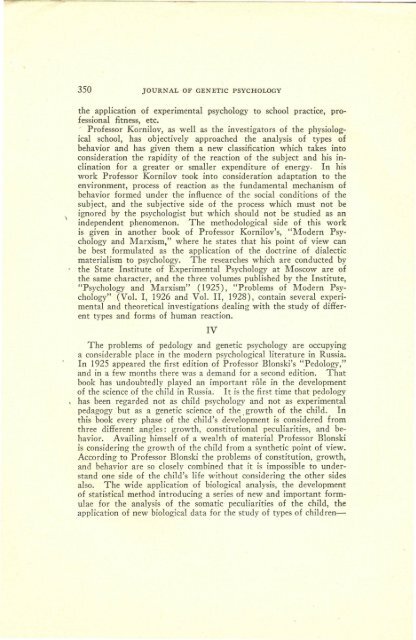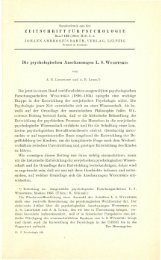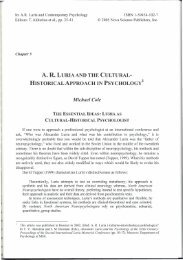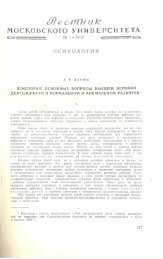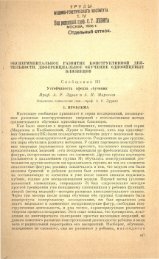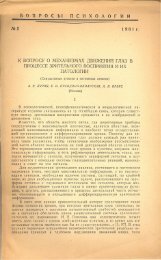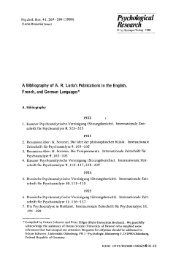Psychology in Russia - Luria, Alexander R.
Psychology in Russia - Luria, Alexander R.
Psychology in Russia - Luria, Alexander R.
Create successful ePaper yourself
Turn your PDF publications into a flip-book with our unique Google optimized e-Paper software.
350 JOURNAL OF GENETIC PSYCHOLOGY<br />
the application of experimental psychology to school practice, professional<br />
fitness, etc.<br />
Professor Kornilov, as well as the <strong>in</strong>vestigators of the physiological<br />
school, has objectively approached the analysis of types of<br />
behavior and has given them a new classification which takes <strong>in</strong>to<br />
consideration the rapidity of the reaction of the subject and his <strong>in</strong>cl<strong>in</strong>ation<br />
for a greater or smaller expenditure of energy. In his<br />
work Professor Kornilov took <strong>in</strong>to consideration adaptation to the<br />
environment, process of reaction as the fundamental mechanism of<br />
behavior formed under the <strong>in</strong>fluence of the social conditions of the<br />
subject, and the subjective side of the process which must not be<br />
ignored by the psychologist but which should not be studied as an<br />
<strong>in</strong>dependent phenomenon. The methodological side of this work<br />
is given <strong>in</strong> another book of Professor Kornilov's, "Modern <strong>Psychology</strong><br />
and Marxism," where he states that his po<strong>in</strong>t of view can<br />
be best formulated as the application of the doctr<strong>in</strong>e of dialectic<br />
materialism to psychology. The researches which are conducted by<br />
, the State Institute of Experimental <strong>Psychology</strong> at Moscow are of<br />
the same character, and the three volumes published by the Institute,<br />
"<strong>Psychology</strong> and Marxism" ( 1925), "Problems of Modern <strong>Psychology</strong>"<br />
(Vol. I, 1926 and Vol. II, 1928), conta<strong>in</strong> several experimental<br />
and theoretical <strong>in</strong>vestigations deal<strong>in</strong>g with the study of different<br />
types and forms of human reaction.<br />
IV<br />
The problems of pedology and genetic psychology are occupy<strong>in</strong>g<br />
a considerable place <strong>in</strong> the modern psychological literature <strong>in</strong> <strong>Russia</strong>.<br />
In 1925 appeared the first edition of Professor Blonski's "Pedology,"<br />
and <strong>in</strong> a few months there was a demand for a second edition. That<br />
book has undoubtedly played an important role <strong>in</strong> the development<br />
of the science of the child <strong>in</strong> <strong>Russia</strong>. It is the first time that pedology<br />
, has been regarded not as child psychology and not as experimental<br />
pedagogy but as a genetic science of the. growth of the child. In<br />
this book every phase of the child's development is considered from<br />
three different angles: growth, constitutional peculiarities, and behavior.<br />
Avail<strong>in</strong>g himself of a wealth of material Professor Blonski<br />
is consider<strong>in</strong>g the growth of the child from a synthetic po<strong>in</strong>t of view.<br />
Accord<strong>in</strong>g to Professor Blonski the problems of constitution, growth,<br />
and behavior are so closely comb<strong>in</strong>ed that it is impossible to understand<br />
one side of the child's life without consider<strong>in</strong>g the other sides<br />
also. The wide application of biological analysis, the development<br />
of statistical method <strong>in</strong>troduc<strong>in</strong>g a series of new and important formulae<br />
for the analysis of the somatic peculiarities of the child, the<br />
application of new biological data for the study of types of children-


